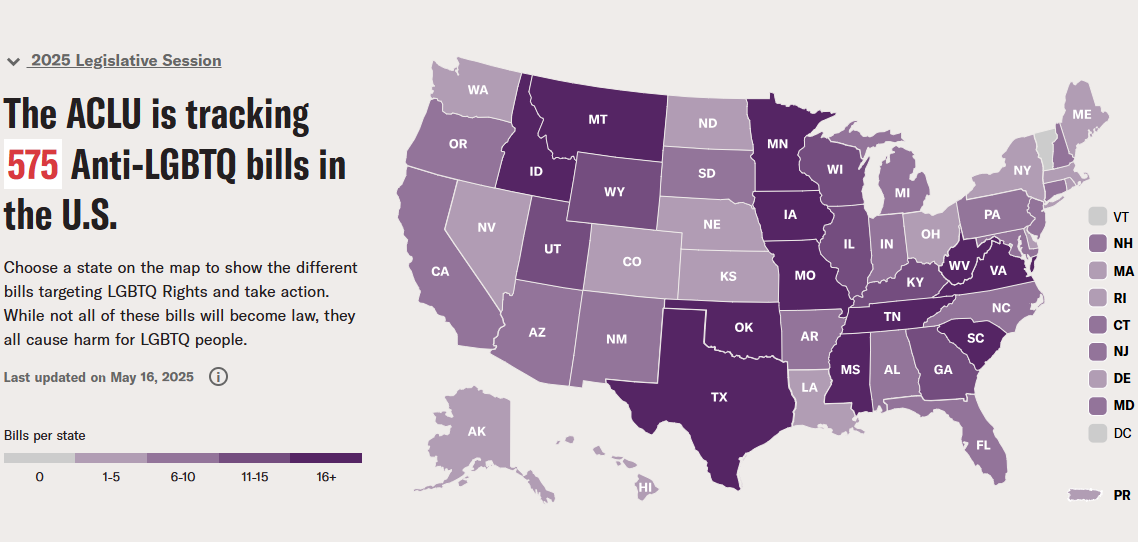A Familiar Pattern
The recent surge in legislative and law enforcement actions targeting LGBTQ+ people in the United States has a chilling resonance with the climate that gave rise to the Stonewall uprising in 1969. Then, as now, queer spaces and events are criminalized, policed, and portrayed as moral threats—and we must once again come together to resist.
Today’s headlines—from anti-trans Executive Orders from the White House and hundreds of anti‑trans bills in state legislatures to the troubling “headcount” raid on Pittsburgh’s P Town Bar during a drag show on Friday, May 2nd —underscore a familiar pattern of harassment and control. Yet, alongside these threats, grassroots, community‑centered Pride events like Lititz Pride offer a model of joyful resistance and local solidarity that commercialized marches cannot replicate.
| Learn more about the Stonewall Riots and their legacy at Britannica: Stonewall riots |
A New Wave of Repression

Today, LGBTQ+ communities face a renewed wave of hostility—this time driven by coordinated legislative campaigns and militarized policing. According to the ACLU’s legislative tracker, over 575 anti‑LGBTQ bills are under consideration in state legislatures across the U.S. in 2025, the vast majority targeting transgender people’s rights, from bathroom access to medical care. Truthout reports that more than 850 anti‑LGBTQ+ measures have been filed so far this year, marking “the most in U.S. history”—a level of coordination unseen since the 1970s.
Federal actions mirror these state efforts. In January 2025, President Trump signed an executive order recognizing only two immutable sexes, effectively erasing protections for non‑binary people and limiting federal anti‑discrimination safeguards. Simultaneously, broad rollbacks of DEI programs in federal agencies have signaled that LGBTQ+ rights are expendable in the name of a narrow ideological agenda.
But perhaps the most visceral echo of Stonewall is the May 2nd P Town Bar raid in Pittsburgh when dozens of state troopers in bulletproof vests stormed the venue during a sold‑out drag performance by Amanda Lepore. Staff, performers, and patrons were forced into the rain for thirty minutes, with no explanation beyond a vague “count heads” excuse—an unsettling reprise of 1960s police tactics toward queer venues.
Pittsburgh drag icon Indica, who was hosting the event, told QBurgh, “It was an LCB raid taken to the extreme. We waited 30 minutes outside for them to inspect every crevice.”
When Visibility Becomes a Target
The P Town raid underscores a broader phenomenon: when queer communities assert visibility—through drag shows, Pride flags, or public gatherings—they become targets. Texas lawmakers, for example, have introduced bills to ban “political flags,” explicitly aimed at outlawing Pride banners in schools and government buildings, despite their protected symbolic status. Meanwhile, the sheer volume of anti‑trans bills—covering sports participation, healthcare access, and identity documentation—reflects a systematic effort to restrict every facet of transgender life.
These measures invoke the same disingenuous logic that justified Stonewall raids: moral panic over gender nonconformity, amplified by politicians and law enforcement. Then, as now, authorities frame LGBTQ+ existence as a public threat requiring surveillance, exclusion, and punishment.
| Learn more about how the moral panic of today endangers all young people: Anti-Trans Moral Panics Endanger All Young People |
Pride as Protest and Community Care
In such a climate, the stakes of Pride are higher than ever. Pride events are not just parades or parties; they are acts of resistance and declarations of humanity. Yet, large-scale, commercial Pride festivals—often sponsored by corporations seeking brand visibility—can unintentionally dilute the original spirit of protest and community care.
That’s not true of Lititz Pride, one of two Pride Festivals in Lancaster County. Organized by Lancaster County Chooses Love, which embodies a grassroots ethos rooted in mutual aid, intentional accessibility, and local solidarity, the Lititz Pride Festival takes place in the organization’s birthplace. A family friendly festival that prioritizes community over profit, it offers an alternative to the larger, louder Lancaster Pride which exists in current form due to the efforts of a small team of community members who, in 2019, rescued Lancaster City’s Pride Festival by forming a standalone 501(c)(3) after the collapse of the original board that operated under the sponsorship of the LGBT Center of Central PA.
During its rebirth, Lancaster Pride was envisioned to be a give-back organization that supported the local LGBTQ+ organization that was rising alongside it, as well as to community members in need. The Lancaster Pride Association’s first Pride took place on the hottest day in July at the Clipper Magazine Stadium. It was nearly everything the fledging board wanted it to be. They succeeded in launching a pride that would soon outgrow the ballpark that so graciously agreed to work with an untested organization. An organization made up of community members with big dreams working tirelessly to fundraise enough to meet the financial requirements needed to bring their dream to life. Executive Partner Laura Sabatini adds, “We’re not in competition with Lancaster Pride, we’re just having more opportunities for our community to have time to celebrate together. And I think that one main difference is that we keep our Pride extremely family-focused because we have been an organization that has, from the beginning, just been connected to more families and serving more queer youth.”
This model contrasts sharply with Lancaster Pride’s high budget, drag-centric event that can overwhelm even the first board chair of the Lancaster Pride Association, Jessica Purdy, who now serves as Lancaster Chooses Love’s Executive Partner for Culture & Operations. She sums up the differences sharing, “Lancaster Pride has grown into a vibrant, high-energy celebration full of drag, performances, and a massive indoor-outdoor festival space. It’s beautiful to see so much community in one place, but for me, it’s overwhelming. In all that noise and chaos, it’s hard to find the quiet connections, the conversations that ground me. Lititz Pride, on the other hand, feels different. It still has music and crowds and color — it’s a joyful chaos — but it holds space for connection. It reminds me of the kind of community event where people gather not just to celebrate, but to connect with one another, to talk, to belong. It feels grounded and sacred. That’s what resonates with me.”
Community Centered Pride in an Era of Backlash
When queer people face systemic attacks—from hostile legislation to raids on queer bars—small‑town, community centered Pride events become more than just festivals; they become a lifeline. These events demonstrate that visibility can be a tool for empowerment rather than merely a provocation. They foster intergenerational bonds, connect isolated individuals to supportive networks, and remind local allies that LGBTQ+ neighbors are worth protecting.
As anti‑LGBTQ bills multiply—targeting everything from school curricula to medical care—community centered Pride festivals provide a blueprint for resilient resistance. They are the embodiment of ‘joy as protest,’ where celebration, community building, and calls to action coexist. They show that love, laughter, and solidarity can counter state‑sanctioned repression.
While the modern commercialized prides and the smaller community centered prides both rose from the Stonewall riots, it is the community-centered prides like Lititz Pride have kept the focus on the community itself and lead the way in creating lasting community connections, acceptance, and community resilience.
Looking Forward: Sustaining Joy and Resistance
The P Town raid and the flood of anti‑LGBTQ legislation remind us that the battles of 1969 are not just history—they are a reminder that our rights must always be defended. But much like the legacy of Stonewall, the rise of Lancaster County Chooses Love from an act of hate also shows how courage, community, and collective action can transform oppression into opportunity.
As Lancaster County Chooses Love continues to expand services—from food pantries to advocacy in school districts, it does so with Pride at its heart. Lititz Pride remains a testament to what Pride must be: a community driven celebration that nurtures, educates, and uplifts in the face of adversity.
“Sometimes we ask, if it gets too big, does it still have that grassroots feel?” said Sabatini. “But really, what I’d really love to see is us getting more sponsorships to support our work throughout the year so we can sustain this work over the years.”
Success, they all agree, is not measured in numbers alone. It’s measured in positive experiences. The kid who dares to try new pronouns at karaoke. In the group of teenagers laughing with Pride flags as capes. In a stranger who walks into a festival and finally feels safe enough to unmask and be fully themselves. Hugo, the board president, recalls a quiet karaoke night where a child tried out new pronouns for the first time. “He beamed with joy,” he says. “It wasn’t a big event. But it was everything.” Laura shares a similar memory: “I saw a group of kids last year laughing, running around with Pride flags like capes,” she says. “And I thought at least for this day, these kids know they are loved. That is everything.”
In 2025, when queer spaces are policed and rights are under siege, we must ask: How will our local Prides speak to this moment?
Lititz Pride speaks to this moment by reclaiming public space as a site of community, safety, joy, and solidarity. What sets Lititz Pride apart is its unwavering commitment to community care and accessibility. It is Pride with a purpose. Not only does it bring together the local queer community, allies, and community benefit organizations, it helps fund the year-round mission of support, service, and advocacy. As Executive Partner Jessica Purdy explains, “We center the experiences and needs of those most at risk—trans kids, queer youth, people with disabilities, and those navigating poverty—because that’s who needs Pride the most right now.”
Board President Hugo Schroeder emphasizes that Lititz Pride is “not about rainbow capitalism; it’s about creating a space where people can exist in their full authenticity without fear.” In an era where drag shows are raided and trans healthcare is being yanked away, that kind of localized, affirming visibility is radical. It’s also deeply personal. Laura Sabatini, Executive Partner, Development and Strategic Initiatives, recalls “The thing I remember most from last year’s Pride was the number of parents with trans kids who came up to us crying and saying, ‘We’ve never felt this safe. We’ve never felt this seen.’ It wasn’t just acceptance. It was actual celebration.” That sense of safety and acceptance, in a time of political erasure, becomes its own kind of resistance. With every flag, every pronoun pin, every hug exchanged at Lititz Pride, the community declares: “We are here, we are loved, we are strong, and we’re not going anywhere.”
Donate Now to support our mission.
Read the first article in the series: Why We Have Lititz Pride: Our Pride Rises from History
Read the second article in this series: Why We Have Lititz Pride: From Hate to a Call to Choose Love


